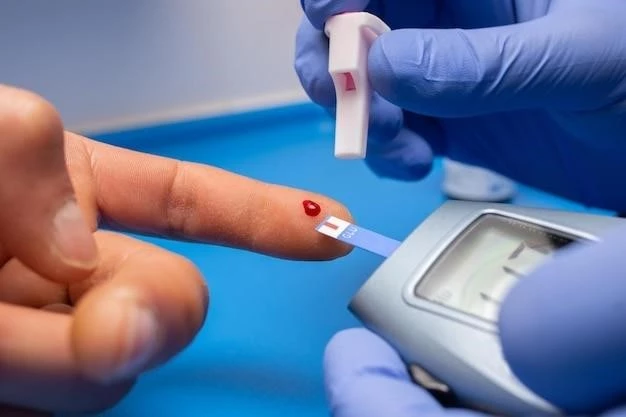Managing Diabetes Mellitus
Diabetes mellitus is a condition that affects blood sugar levels due to issues with insulin production or utilization by the pancreas. Proper management is key to avoiding complications such as neuropathy, retinopathy, nephropathy, and heart disease.
Understanding Diabetes Mellitus
Diabetes mellitus is a chronic condition characterized by high blood sugar levels (glucose) either due to the pancreas not producing enough insulin or the cells not responding effectively to insulin. Insulin is a hormone that helps glucose enter cells for energy production. There are two main types⁚ Type 1٫ where the immune system attacks pancreatic cells producing insulin٫ and Type 2٫ which is related to lifestyle factors and genetics.
Complications of diabetes can affect various organs. Neuropathy can damage nerves, leading to tingling or numbness in limbs. Retinopathy affects the eyes, potentially causing vision problems or blindness. Nephropathy affects the kidneys, impairing their function. Heart disease is also a significant risk for diabetics due to the impact on blood vessels and circulation.
Understanding diabetes involves knowing how to manage blood sugar levels effectively through a combination of diet, exercise, medication, and monitoring. Lifestyle factors such as weight management play a crucial role in controlling diabetes. Additionally, recognizing genetic influences and risk factors can aid in preventive strategies and tailored management plans.
Complications of Diabetes
Diabetes can lead to various complications that affect different parts of the body. Neuropathy is a common complication that damages nerves, causing pain, tingling, or numbness, especially in the legs and feet. Retinopathy impacts the eyes, potentially leading to vision loss or blindness over time. Nephropathy affects the kidneys, leading to kidney damage and eventual kidney failure if left uncontrolled.
Heart disease is a serious concern for individuals with diabetes, as high blood sugar levels can damage blood vessels and the heart over time, increasing the risk of heart attacks, stroke, and other cardiovascular problems. Controlling blood sugar levels, blood pressure, and cholesterol are crucial in managing heart health.
Preventing and managing these complications involve a multi-faceted approach. Regular monitoring of blood sugar levels, annual eye exams, kidney function tests, and heart health assessments are essential. Maintaining a healthy lifestyle through diet modifications, regular exercise, weight management, and medication adherence are key factors in reducing the risk and progression of complications associated with diabetes.
Importance of Management
Managing diabetes is crucial in preventing complications and maintaining overall health. By effectively controlling blood sugar levels through diet, exercise, medication, and monitoring, individuals can reduce the risk of neuropathy, retinopathy, nephropathy, and heart disease.
A balanced diet plays a central role in diabetes management. Consuming fiber-rich foods, whole grains, lean proteins, and healthy fats can help stabilize blood sugar levels. Monitoring carbohydrate intake is essential for blood sugar control. Regular physical activity is also vital, as exercise can improve insulin sensitivity and help manage weight.
Medication, including insulin therapy, may be necessary for some individuals to regulate blood sugar levels effectively. Monitoring blood sugar levels regularly is essential to track progress and make adjustments to the treatment plan as needed. Weight management through a healthy lifestyle can further improve diabetes control and reduce the risk of complications.
Understanding the genetic factors and individual risk assessment for diabetes can guide personalized management strategies. Being proactive in managing the disease can lead to better outcomes and an improved quality of life. Consult with healthcare providers regularly to ensure a comprehensive and effective diabetes management plan tailored to your specific needs.
Diet and Nutrition
Proper diet and nutrition are essential components of managing diabetes effectively. A balanced diet can help control blood sugar levels and reduce the risk of complications. Focus on consuming a variety of nutrient-dense foods, including fruits, vegetables, whole grains, lean proteins, and healthy fats.
Monitoring carbohydrate intake is crucial for individuals with diabetes. Choose complex carbohydrates that are high in fiber, as they have a lower impact on blood sugar levels. Be mindful of portion sizes to avoid spikes in blood glucose. Incorporating protein into each meal can help stabilize blood sugar throughout the day.
Avoid sugary beverages, refined grains, and processed foods high in added sugars and unhealthy fats. Opt for water as your primary beverage and limit the consumption of sugary snacks and desserts. Reading food labels can help you make informed choices about the products you consume.
Eating at regular intervals and spacing out meals evenly throughout the day can help maintain consistent blood sugar levels. Consider working with a registered dietitian to develop a personalized meal plan that meets your nutritional needs and diabetes management goals. Remember, a healthy diet is a cornerstone of managing diabetes and promoting overall well-being.
Exercise and Physical Activity
Regular exercise and physical activity are vital components of managing diabetes and improving overall health. Physical activity can help control blood sugar levels, increase insulin sensitivity, and promote weight management. Aim for at least 150 minutes of moderate-intensity aerobic activity per week.
Choose activities you enjoy, such as walking, cycling, swimming, or dancing, to make exercise a sustainable part of your routine. Strength training exercises, such as lifting weights or using resistance bands, can also benefit individuals with diabetes by building muscle and improving metabolism.
Before starting any exercise program, consult with your healthcare provider to ensure it is safe for your individual health needs. Monitor your blood sugar levels before, during, and after exercise, especially if you use insulin or certain medications that can cause hypoglycemia. Always carry fast-acting glucose sources in case of low blood sugar.
Stay hydrated during physical activity and wear appropriate footwear to prevent foot complications. Listen to your body and adjust your activity level based on how you feel. Consistency is key, so establish a regular exercise routine that you can maintain over time. Remember, physical activity is not only beneficial for diabetes management but also for your overall well-being.
Medication and Insulin Therapy
For individuals with diabetes, medication and insulin therapy may be necessary to manage blood sugar levels effectively. Medications such as oral glucose-lowering drugs or injectable insulin help regulate glucose levels in the body. Work closely with your healthcare provider to determine the most suitable medication regimen for your specific needs.
Insulin therapy is often prescribed for individuals with Type 1 diabetes or advanced Type 2 diabetes who cannot control their blood sugar through other means. Different types of insulin are available, including rapid-acting, short-acting, intermediate-acting, and long-acting. Your healthcare provider will guide you on the appropriate insulin type, dosage, and injection technique.
It is crucial to adhere to your medication schedule as prescribed by your healthcare team. Monitor your blood sugar levels regularly to assess the effectiveness of the medication and make any necessary adjustments. Be aware of potential side effects and complications associated with your medications, and communicate any concerns with your healthcare provider.
In addition to medication, lifestyle modifications such as a healthy diet, regular exercise, weight management, and stress reduction can complement the effects of medication in controlling diabetes. Remember, medication and insulin therapy are valuable tools in diabetes management, but a holistic approach that includes lifestyle changes is key to achieving optimal health outcomes.
Monitoring Blood Sugar Levels
Regular monitoring of blood sugar levels is essential for individuals with diabetes to ensure optimal management of the condition. Monitoring helps you understand how your body responds to food, physical activity, medications, and other factors impacting blood sugar levels. It also enables you to make timely adjustments to your treatment plan.
There are various methods for monitoring blood sugar levels, including fingerstick testing, continuous glucose monitoring systems, and flash glucose monitoring devices. Your healthcare provider can recommend the most suitable monitoring method based on your individual needs and lifestyle.
It is important to establish a monitoring schedule that aligns with your treatment plan. Monitor your blood sugar levels at designated times throughout the day, such as before and after meals, before bedtime, and during physical activity. Keep a log of your readings to track patterns and share them with your healthcare provider during follow-up appointments.
If you notice consistently high or low blood sugar levels, consult your healthcare provider promptly. They can help you understand the potential reasons behind fluctuations and make adjustments to your diet, exercise, medication, or insulin therapy as needed. Remember, proactive monitoring is a key component of successful diabetes management and plays a crucial role in preventing complications.
Weight Management
Weight management is essential for individuals with diabetes to improve blood sugar control and reduce the risk of complications. Maintaining a healthy weight can enhance insulin sensitivity, lower blood sugar levels, and promote overall well-being. A combination of healthy eating habits, regular physical activity, and lifestyle changes can support weight management goals.
Focus on consuming nutrient-dense foods that are low in added sugars, unhealthy fats, and excess calories. Incorporate a variety of fruits, vegetables, whole grains, lean proteins, and healthy fats into your meals. Be mindful of portion sizes and practice mindful eating to prevent overeating.
Physical activity plays a key role in weight management by burning calories, increasing metabolism, and improving muscle mass. Aim for a combination of aerobic exercises, strength training, and flexibility exercises to support overall fitness and weight loss goals. Consult with a fitness professional to develop an exercise plan tailored to your needs and preferences.
Set realistic and achievable weight loss goals to avoid feelings of discouragement. Keep track of your progress, celebrate small victories, and stay motivated on your weight management journey. Engage in activities that bring you joy and support a positive mindset towards achieving a healthy weight. Remember, weight management is a lifelong commitment that can positively impact your diabetes management and overall health.

Genetic Factors and Risk Assessment
Understanding genetic factors and conducting a thorough risk assessment are crucial steps in managing diabetes effectively. Genetics can play a significant role in the development of Type 1 and Type 2 diabetes. Individuals with a family history of diabetes may have an increased risk of developing the condition.
A comprehensive risk assessment involves evaluating various factors, including family history, age, weight, physical activity level, diet, ethnicity, and medical history. Healthcare providers use this information to assess an individual’s risk of developing diabetes and tailor a personalized management plan accordingly.
Genetic testing may be recommended in certain cases to identify specific genetic markers associated with diabetes risk. Understanding your genetic predisposition can help guide preventive measures, lifestyle modifications, and early intervention strategies to mitigate the risk of developing diabetes or its complications.
By recognizing the genetic factors and risk assessment results, individuals can make informed decisions about their health and take proactive steps to manage diabetes effectively. Work closely with healthcare providers to develop a comprehensive plan that addresses both genetic influences and modifiable risk factors to optimize diabetes management and overall well-being.
Dealing with Hypoglycemia and Hyperglycemia
Managing blood sugar levels is vital in preventing hypoglycemia (low blood sugar) and hyperglycemia (high blood sugar) episodes in individuals with diabetes. Hypoglycemia can occur due to excess insulin, delayed or skipped meals, or strenuous physical activity. Symptoms include shakiness, sweating, dizziness, and confusion.
If you experience hypoglycemia, promptly consume a fast-acting carbohydrate source such as glucose tablets, fruit juice, or regular soda to raise your blood sugar levels. Recheck your blood sugar after 15 minutes and repeat if necessary. It’s essential to always carry snacks or glucose sources in case of low blood sugar emergencies.
Hyperglycemia can result from factors like insufficient insulin, illness, stress, or high carbohydrate intake. Symptoms include increased thirst, frequent urination, fatigue, and blurred vision. If you experience hyperglycemia, drink water, engage in physical activity, and follow your healthcare provider’s recommendations for adjusting your treatment plan.
Regular monitoring of blood sugar levels, adhering to your medication regimen, staying hydrated, and maintaining a healthy lifestyle can help prevent hypoglycemia and hyperglycemia. Educate yourself and your loved ones on the signs and treatment of both conditions. Work closely with your healthcare team to develop a comprehensive strategy for managing blood sugar fluctuations effectively.
